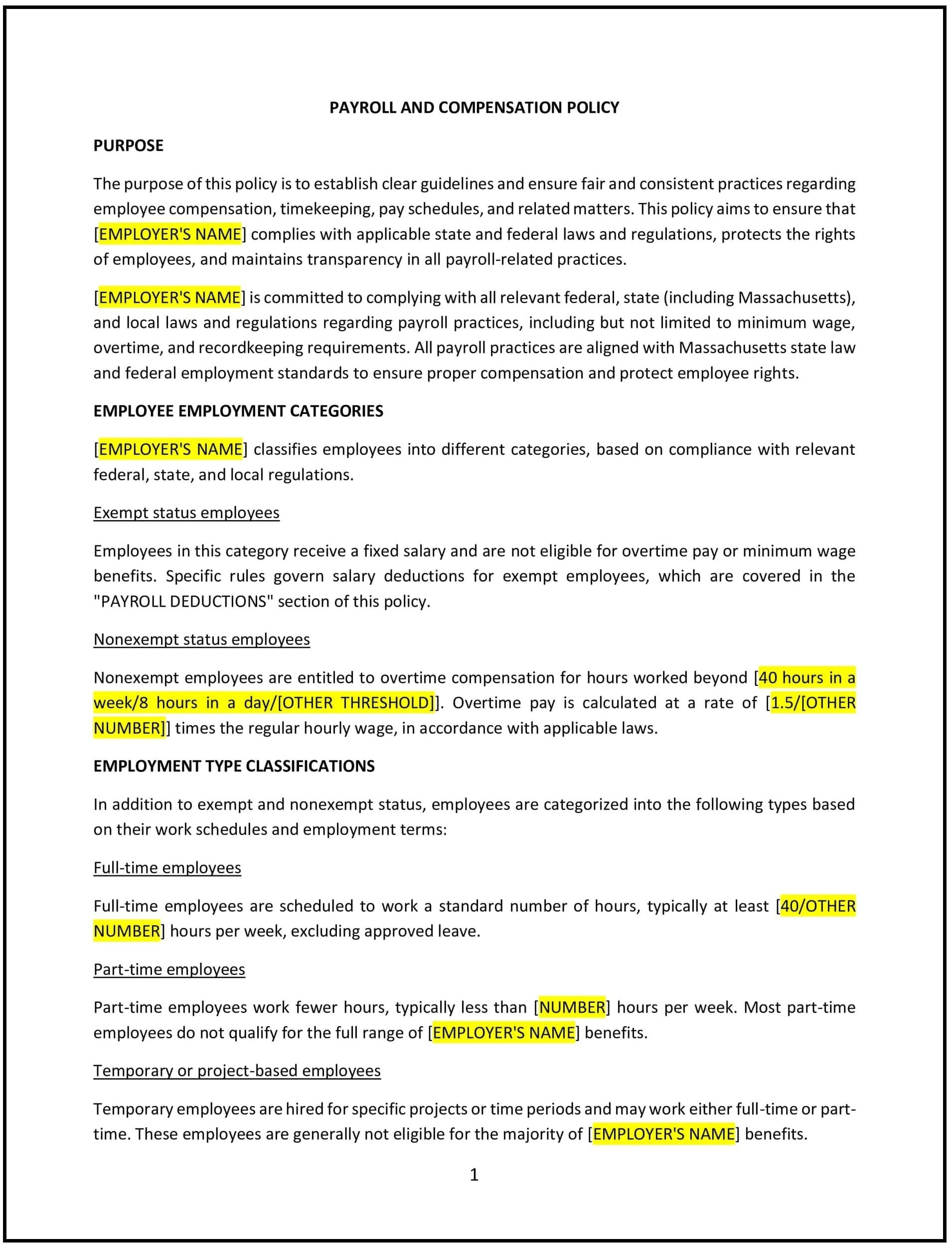Payroll and compensation policy (Massachusetts): Free template
Got contracts to review? While you're here for policies, let Cobrief make contract review effortless—start your free review now.

Customize this template for free
This payroll and compensation policy is designed to help Massachusetts businesses establish clear, consistent, and legally compliant guidelines for employee pay, salary, and compensation practices. The policy outlines the company’s approach to compensating employees, including pay structures, payment schedules, benefits, overtime, deductions, and bonuses. It supports compliance with Massachusetts state laws and federal regulations, such as the Fair Labor Standards Act (FLSA), and helps the company maintain transparency and fairness in its payroll practices.
By adopting this policy, businesses can ensure that employees are paid accurately and on time while complying with relevant wage and hour laws.
How to use this payroll and compensation policy (Massachusetts)
- Define compensation structure: Specify the company’s compensation structure, including how pay is determined for each position. The policy should outline salary ranges, hourly wages, or commission-based pay and provide clear criteria for how compensation is reviewed and adjusted.
- Payment schedule: Define the company’s payment schedule, including whether employees are paid weekly, bi-weekly, semi-monthly, or monthly. The policy should specify the day of the week or month that employees will receive their pay and how payment is made (e.g., direct deposit, paper check).
- Overtime and additional pay: Clearly define the company’s policy on overtime pay, in compliance with Massachusetts state law and FLSA. Specify the overtime rate (typically time-and-a-half for hours worked over 40 hours per week) and how overtime is calculated for exempt and non-exempt employees.
- Deductions: Outline the types of deductions that may be made from an employee’s pay, including mandatory deductions (e.g., taxes, Social Security, Medicare), voluntary deductions (e.g., retirement plan contributions, insurance premiums), and any other deductions that may apply under state or federal law.
- Bonuses and incentives: Specify the company’s policy on bonuses, performance-based incentives, or other types of financial rewards. Include details about eligibility, the timing of bonus payments, and the criteria for earning bonuses or incentives.
- Pay equity and fairness: Emphasize the company’s commitment to ensuring that all employees are paid fairly and equitably. The policy should include guidelines for ensuring that pay practices align with the company’s values of diversity, equity, and inclusion, and that pay disparities are addressed.
- Benefits and allowances: Outline the employee benefits and allowances offered by the company, such as health insurance, retirement contributions, paid time off (PTO), sick leave, and any other benefits provided as part of the compensation package.
- Compliance with Massachusetts and federal laws: Ensure that the policy complies with Massachusetts state laws, including the Massachusetts Wage Act, as well as federal regulations such as FLSA. The policy should also outline the company’s responsibilities related to minimum wage laws and wage theft prevention.
- Review and update regularly: Periodically review and update the policy to ensure it complies with changes in Massachusetts state laws, federal regulations, and the company’s evolving payroll practices.
Benefits of using this payroll and compensation policy (Massachusetts)
This policy offers several benefits for Massachusetts businesses:
- Ensures legal compliance: The policy helps businesses comply with Massachusetts wage and hour laws, FLSA, and other relevant regulations, reducing the risk of legal issues or disputes related to payroll practices.
- Promotes transparency and fairness: By clearly outlining compensation structures, payment schedules, and benefits, the policy promotes transparency and ensures that all employees are paid fairly and consistently.
- Supports employee satisfaction and retention: Offering competitive compensation and benefits packages helps businesses attract and retain top talent. A well-defined payroll policy enhances employee satisfaction by ensuring they are paid accurately and on time.
- Reduces payroll errors: Establishing clear guidelines and processes for payroll and compensation helps prevent mistakes in calculations or payment schedules, reducing the risk of disputes or underpayments.
- Enhances company reputation: A company with a well-managed payroll and compensation policy is viewed positively by employees and potential hires. Transparent pay practices build trust and demonstrate a commitment to fair treatment and equitable compensation.
- Improves financial management: The policy helps businesses manage payroll expenses more effectively by setting clear guidelines for compensation, bonuses, and deductions, and provides a framework for budgeting and financial planning.
Tips for using this payroll and compensation policy (Massachusetts)
- Communicate the policy clearly: Ensure that all employees are aware of the payroll and compensation policy and understand their rights and responsibilities regarding pay and benefits. This can be done through employee handbooks, onboarding, and regular communication.
- Regularly review employee pay: Conduct regular reviews of employee pay to ensure that compensation remains competitive and aligned with industry standards. This helps businesses attract and retain skilled employees while preventing pay disparities.
- Monitor compliance with state and federal laws: Regularly monitor changes to Massachusetts state laws and federal regulations regarding wages, overtime, and deductions to ensure the policy remains compliant with the latest legal requirements.
- Train payroll staff: Train payroll and HR staff on the company’s payroll policies and legal requirements to ensure that payments are made accurately and on time, and that deductions are properly handled.
- Address employee concerns promptly: Provide a process for employees to ask questions or raise concerns about their pay. Address any discrepancies or misunderstandings quickly to prevent dissatisfaction or confusion.
- Review and update regularly: Periodically review the policy to ensure it reflects any changes in legal requirements, compensation practices, or business operations. Make necessary updates to ensure the policy continues to meet the needs of the business and employees.